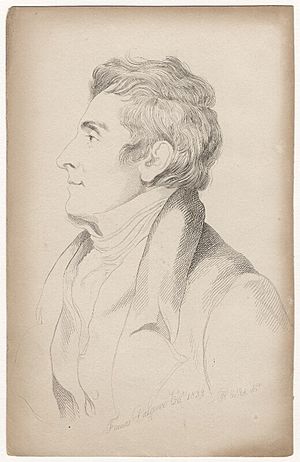Francis Palgrave facts for kids
Quick facts for kids
Francis Palgrave
KH FRS
|
|
|---|---|
 |
|
| Born | July 1788 |
| Died | 6 July 1861 London |
| Occupation |
|
| Children | Francis Turner Palgrave, Gifford Palgrave, Reginald Palgrave, Inglis Palgrave |
| Parent(s) | |
Sir Francis Palgrave (born Francis Ephraim Cohen, July 1788 – 6 July 1861) was an important English archivist and historian. An archivist is someone who looks after old documents and records. A historian studies and writes about the past.
Palgrave was the chief executive of the Public Record Office from when it started in 1838 until he died. This office was created to keep all of the government's important historical documents safe. He is also well-known for the many books and papers he wrote.
Contents
Early Life and Name Change
Francis Cohen was born in London in July 1788. His father, Meyer Cohen, was a stockbroker. Francis was the oldest son and had to help support his parents when his father lost money in 1810.
He first worked as a clerk for a law firm in London. He stayed there as the main clerk until 1822. Around 1814, he started writing for a magazine called the Edinburgh Review.
In 1819, Francis met a banker named Dawson Turner and his daughter Elizabeth. Francis helped them with a book about old buildings. In 1821, he became a member of the Royal Society, which is a group for important scientists. Dawson Turner helped him join.
Before he married Elizabeth Turner on October 13, 1823, Francis Cohen changed his religion to Anglican Christianity. Around the same time, he also changed his last name to "Palgrave." This was his wife's mother's maiden name. His father-in-law paid for the name change and gave the couple money.
Career as a Historian
Palgrave became a lawyer in 1827. He had worked for lawyers for a long time before this.
In 1822, he suggested that the government should publish its old records. From 1827, he helped prepare several books of medieval texts for the Record Commission. This group was in charge of publishing old government documents. Some of his important works included:
- Parliamentary Writs and Writs of Military Summons (1827 and 1834)
- Rotuli Curiae Regis: Rolls and Records of the Court held before the King's Justiciars or Justices (1835)
Palgrave also wrote his own history books. These included:
- A History of England (1831)
- The Rise and Progress of the English Commonwealth (1832)
- The History of Normandy and England (1851–64)
Founding the Public Record Office
Francis Palgrave is seen as the person who started the Public Record Office. In 1834, he became the Keeper of the Records at Westminster Abbey. This was where very old government documents were kept, including the famous Domesday Book. The Domesday Book is a survey of England from 1086.
From this job, he produced another important work called The Ancient Kalendars and Inventories of the Treasury of His Majesty's Exchequer (1836).
In 1838, he was made the Deputy Keeper of the new Public Record Office. He held this important position until he died. In this role, he published 22 yearly reports about the office's work.
Palgrave was knighted in 1832, which means he was given the title "Sir." He also became an honorary member of important societies in America, like the American Academy of Arts and Sciences in 1834 and the American Antiquarian Society in 1860.
Family Life
Francis Palgrave married Elizabeth Turner on October 13, 1823. Her parents were Dawson Turner and Mary Palgrave. Elizabeth's sister, Maria, married another famous person, Sir William Jackson Hooker, a botanist.
Francis and Elizabeth Palgrave had four sons. All of them became well-known authors and experts in their own fields:
- Francis Turner Palgrave (1824–1897): He was a poet and teacher. He is famous for editing Palgrave's Golden Treasury, a collection of English poems.
- (William) Gifford Palgrave (1826–1888): He was a priest and traveler who became a diplomat. He also studied different cultures.
- Sir Robert Harry Inglis Palgrave (1827–1919): He was an economist and was knighted in 1909. He wrote Palgrave's Dictionary of Political Economy.
- Sir Reginald Francis Douce Palgrave (1829–1904): He was the Clerk of the House of Commons, which is a high-ranking job in the British Parliament.
Palgrave's wife, Elizabeth, passed away in August 1852, before him.
 | Jewel Prestage |
 | Ella Baker |
 | Fannie Lou Hamer |

